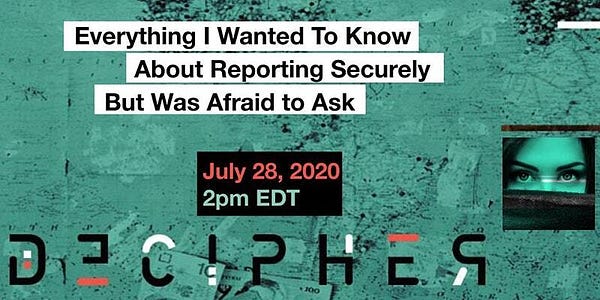Encryption laws are hurting Australia's tech sector I New Zealand sets standards for government use of algorithms I AI uncovers more than 900 Chinese vessels in North Korean waters


Follow us on Twitter. The Daily Cyber Digest focuses on the topics we work on, including cyber, critical technologies & strategic issues like foreign interference.
Tech giant Atlassian says controversial encryption laws have damaged the reputation of the technology sector, discouraged talent from working in Australia, and harmed an industry that could help drive economic growth in the nation’s post-Covid-19 recovery. The Guardian
New Zealand’s government says it is the first in the world to produce a set of standards for how public agencies should use the algorithms that increasingly drive decision-making by officials about every area of public life. The Guardian
Huge fleets of Chinese fishing boats have been caught stealthily operating in North Korean waters – while having their tracking systems turned off. The potentially illegal fishing operation was revealed through a combination of artificial intelligence, radar and satellite data. Wired
ASPI ICPC


Read ASPI ICPC’s report Uyghurs for sale: ‘Re-education’, forced labour and surveillance beyond Xinjiang.
How can journalists avoid being used in disinformation operations?
The Strategist
@AlexandraPasc_
Disinformation and information operations more broadly constitute a multifaceted problem. A wide variety of people have a responsibility to respond, including political actors, social media platforms, civil society actors and even individuals not directly involved in the process. Journalists and media outlets can often find themselves at the coalface of information operations. While many in the field have a high degree of awareness of and resilience to such tactics, the profession must develop a clear understanding of how these operations work if journalists are to avoid being used by actors out to deceive.
Why do conspiracy theorists film themselves refusing to wear face masks?
The Strategist
@elisethoma5
Over several weeks, viral videos have appeared on social media showing individuals flouting public health recommendations and legal requirements and actively attempting to provoke confrontations with staff (or in some cases even police officers) responsible for enforcing those rules. This trend has increased sharply in Australia since the requirement for people to wear face masks in public spaces went into effect in Melbourne. A range of conspiratorial beliefs are fuelling these incidents.




Australia
Encryption laws are hurting Australia's tech sector, Atlassian says
The Guardian
@knausc
The tech giant Atlassian says controversial encryption laws have damaged the reputation of the technology sector, discouraged talent from working in Australia, and harmed an industry that could help drive economic growth in the nation’s post-Covid-19 recovery.
ACSC, DTA release joint cyber security guidance
Defence Connect
Two of Australia’s top cyber institutions have released a new Cloud Security Guidance, which provides information about the secure adoption of cloud services across government and industry. The news comes on the back of growing concerns about Australia’s cyber capabilities and a changing strategic environment.
App to track social distancing in the office bags funding
Australian Financial Review
@michaeljbaile
A workplace software start-up that can help enforce social distancing in offices has raised $5 million from investors including Blackbird Ventures. XY Sense, founded in 2016 by Melbourne-based entrepreneurs Alex Birch and Luke Murray, uses sensors and an artificial intelligence platform to monitor how people are using a workspace.
Chinese students in Australia targeted in virtual kidnapping scam
BBC News
Chinese students in Sydney are being targeted in a kidnapping scam forcing them to pay massive ransoms to fraudsters, Australian police say. In many cases, blackmailed students were forced to stage their own kidnapping and send video proof to relatives in China to obtain funds.
Pentagon backs Lynas to break China’s rare earths stranglehold
Financial Times
@JamieSmythF
Lynas Corp has secured US government funding to design a A$50m ($36m) processing plant in Texas that aims to break China’s stranglehold on the commercial separation of heavy rare earths materials widely used in high-tech industries. The contract approval comes as concerns grow in Washington that Beijing could use its dominance of the rare earths supply chain to pressure US arms suppliers, after China this month threatened to impose sanctions on Lockheed Martin.
China
China leads the way on global standards for 5G and beyond
Nikkei Asian Review
China has become a central player in writing international rules for emerging technologies, particularly fifth-generation wireless, as part of a national effort to shape the playing field in its favour.
China-Backed Crypto Guru Wants to Unify the World’s Blockchains
Bloomberg
@pingroma
The blockchain world today is thousands of disparate platforms that can’t talk to each other. So a little-known startup hatched one of the most ambitious plans yet to bridge all the divides -- and it’s got the backing of the Chinese government.
USA
Google to Keep Employees Home Until Summer 2021 Amid Coronavirus Pandemic
The Wall Street Journal
@realrobcopeland
Google will keep its employees home until at least next July, people familiar with the matter said, making the search-engine giant the first major U.S. corporation to formalize such an extended timetable in the face of the coronavirus pandemic.
Biden Campaign Bans Staff From Trading Stocks Without Approval
Bloomberg
The Biden campaign also instructed its staff members to delete TikTok, the Chinese-owned social media application, from their personal and work phones because of security and privacy concerns. Remus told staff to ‘refrain from downloading and using TikTok on work and personal devices.’ The Biden campaign has no official presence on the social media application, which politicians and security experts have raised cybersecurity concerns about. Both the Democratic National Committee and Republican National Committee have warned their candidates and staff about using the Chinese-owned social media application.

Why Congress should look at Twitter and Facebook
MIT Technology Review
@bostonjoan
If America’s politicians really care about the damage online platforms can do, they should look at online conspiracy theories’ and how they’re made worse by the design of social media sites.
Garmin obtains decryption key after ransomware attack
Sky News
@AJMartinSky
Smartwatch maker Garmin has obtained the decryption key to recover its computer files from a ransomware attack last Thursday. Garmin's services were taken offline after hackers infected the company's networks with a ransomware virus known as WastedLocker.
US Digital Bank Dave Admits Customer Data Breach
Infosecurity
@philmuncaster
A US fintech giant has admitted that it suffered a breach of customers’ personal data via a third party supplier, after researchers found a database containing millions of records for sale online.


North Asia
Huge fleets of Chinese boats have been hiding in North Korean waters
WIRED
@yaelwrites
A combination of satellite tech and AI has helped uncover more than 900 Chinese vessels that might be illegally fishing in North Korean waters.
Xinjiang is prototype for fully totalitarian state: Taiwan minister
Nikkei Asian Review
@sharp_writing
China is using new technology to turn its western region of Xinjiang into a model for a fully authoritarian surveillance state, Taiwan's digital minister said on Monday.
The United States and Japan Should Team Up on 5G
Carnegie Endowment for International Peace
@SchoffJ
The Olympics might be postponed, but international 5G competition is ramping up. The coronavirus is spreading amid intensified technological competition between the United States and China, which is creating new opportunities for European, Japanese, and U.S. companies to collaborate. Meanwhile, governments are continuing to work together in multilateral forums, even as the leading Chinese 5G vendor Huawei gains market share. To establish a competitive edge, policymakers in Tokyo and Washington should focus on a few priority areas.
South Asia
Falling telecom business triggers layoffs at Huawei India; company slashes revenue target for 2020
The Economic Times
Chinese telecom equipment maker Huawei has slashed its India revenue target for 2020 by up to 50% and is laying off 60-70% of staff, excluding those in research and development and the Global Service Centre, said several persons with knowledge of the matter.
India bans 47 apps cloning restricted Chinese services
TechCrunch
@refsrc
India, which blocked 59 apps developed by Chinese firms late last month on the grounds that they pose a threat to the nation’s security, has banned an additional 47 apps.
How India became a hack-for-hire hub
Livemint
@undertecher
Politicians, companies and activists are increasingly being targeted by a secretive industry. How does it work?
NZ & Pacific Islands
New Zealand claims world first in setting standards for government use of algorithms
The Guardian
@lightyouonfire
New Zealand’s government says it is the first in the world to produce a set of standards for how public agencies should use the algorithms that increasingly drive decision-making by officials about every area of public life.


UK
Huawei urges carriers to stick with its 5G gear after UK ban
Nikkei Asian Review
China's Huawei Technologies has urged global carriers to stick with it and continue buying its networking gear if they want to stay ahead in the 5G race. It is the company's first public comment since the British government made a dramatic U-turn and banned the world's biggest telecom equipment maker from its next-generation network.
Twitter faces ‘walkout’ over its handling of British grime star’s anti-Semitic tweets
CNBC
@SAM_L_SHEAD
Twitter is facing a ‘walkout’ over its handling of a string of anti-Semitic tweets that appeared on the account of British rapper Wiley on Friday and Saturday.
How the UK can get a better grip on Russian espionage
WIRED
@KateOflaherty
The Official Secrets Act was first drafted in 1911 and even with revisions is hilariously out of date. To tackle foreign interference, something new entirely is needed.
Europe
Facebook takes EU to court for invading privacy
Financial Times
Facebook has taken the EU to court for invading the privacy of its employees, according to two people with direct knowledge of the matter. The social media company claims EU regulators have asked broad questions beyond the scope of two ongoing antitrust probes, and it has requested that the General Court in Luxembourg intervene.
Google victory in German top court over right to be forgotten
Deutsche Welle
A German court has sided with Google and rejected requests to wipe entries from search results. The cases hinged on whether the right to be forgotten outweighed the public's right to know. This is the first ruling by Germany's top court since the EU's general data protection regulation came into effect in 2018.
How Police Secretly Took Over a Global Phone Network for Organized Crime
Motherboard
@josephfcox
Unbeknownst to Mark, or the tens of thousands of other alleged Encrochat users, their messages weren't really secure. French authorities had penetrated the Encrochat network, leveraged that access to install a technical tool in what appears to be a mass hacking operation, and had been quietly reading the users' communications for months. Investigators then shared those messages with agencies around Europe.
EU to limit tech exports to Hong Kong after Chinese clampdown
Reuters
@fraguarascio
The European Union will limit technology exports to Hong Kong that may be used for repression or surveillance, an EU draft document seen by Reuters said, in the bloc's first concrete reaction to the Chinese security clampdown on the territory. The document, backed by EU ambassadors, says the bloc will be "further scrutinising and limiting exports of specific sensitive equipment and technologies for end-use in Hong Kong, in particular where there are grounds to suspect undesirable use relating to internal repression, the interception of internal communications or cyber surveillance".
EU urges member states to adopt 5G security measures
Techradar
@MickeyCaskill
The EU has urged member states to accelerate the implementation of measures designed to reduce the potential security threats of 5G networks.
COVID-19 tracing apps proving to be a tricky business around the world
Deutsche Welle
Scores of digital contract tracing apps have been developed around the world in an attempt to stem the pandemic. Many have floundered and for those that haven't, it's still not clear if they are that effective.
Middle East
Egypt TikTok: Female influencers jailed over 'indecent' videos
BBC News
A court in Egypt has sentenced five young women to two years in prison for posting "indecent videos" on the video-sharing app TikTok.The jail sentences are the first to have been issued by a court as part of a campaign by the authorities against social media influencers.
Africa
China to lend Nigeria $325m to build northern fibre backbone
Capacity Media
China’s Eximbank is to lend Nigeria the equivalent of US$325 million to expand its Galaxy national fibre infrastructure into the north of the country.
Misc
This is what a deepfake voice clone used in a failed fraud attempt sounds like
The Verge
@jjvincent
One of the stranger applications of deepfakes — AI technology used to manipulate audiovisual content — is the audio deepfake scam. Hackers use machine learning to clone someone’s voice and then combine that voice clone with social engineering techniques to convince people to move money where it shouldn’t be. Such scams have been successful in the past, but how good are the voice clones being used in these attacks? We’ve never actually heard the audio from a deepfake scam — until now.
Read ASPI ICPC’s report Weaponised deep fakes - National security and democracy.
It's OK If Countries Hack Each Other's Vaccines
Vice
It’s important to consider why Western intelligence agencies made the alleged attempted hacking public, said Austin Carson, a political science professor at the University of Chicago who studies secrecy and intelligence. One reason may be that these nations wanted to set boundaries for cyberespionage and censure Russia’s actions as out-of-bounds.
AI model developed to identify individual birds without tagging
The Guardian
@patrick_barkham
But now researchers have built the first artificial intelligence tool capable of identifying individual small birds. Computers have been trained to learn to recognise dozens of individual birds’ which could potentially save scientists arduous hours in the field with binoculars, as well as the catching of birds to fit coloured rings to their legs.
Telecoms networks look to fix Huawei problem with open source software
Financial Times
@NicFildes
Mr Amin is a trailblazer of the nascent “OpenRAN” movement and is now on the verge of launching a national 5G network without the help of Huawei or its main European competitor Ericsson.
Facebook’s ‘Red Team’ Hacks Its Own AI Programs
WIRED
Attackers increasingly try to confuse and bypass machine-learning systems. So the companies that deploy them are getting creative.
Why are millennials and Gen Z turning to Instagram as a news source?
The Guardian
@WhatKatieBWrote
Recently published data exploring how people accessed news and information about the coronavirus pandemic found, in the US, for 18- to 24-year-olds (the age group most likely to use social media as a source), over a quarter of respondents used Instagram to access news content within the last week, while 19% used Snapchat and 6% turned to TikTok. In comparison, only 17% used newspapers to access information. Globally, figures reached even higher levels - in Germany, 38% of 18- to 24-year-olds used Instagram alone to access the news, and in Argentina, this reached as high as 49%.
Research
Unpacking China's Digital Silk Road
Clingendael
@BrigitteDekker_ @MaaikeOh
Aiming to contribute to a better understanding of China’s Digital Silk Road (DSR) and its implications for Europe, this Clingendael Report analyses the concept, objectives and activities of the digital subset of China’s Belt and Road Initiative.
Read Clingendael’s report Unpacking China’s Digital Silk Road.


Events
Tech wars, the liberal order and the rise of China
Observer Research Foundation
This webinar will be livecast from 5:30 p.m. IST. The webinar will be moderated by Dhruva Jaishankar, Director, US Initiative, ORF. The speakers are Elsa B. Kania, Adjunct Senior Fellow, Technology and National Security Program, Center for a New American Security, and James Andrew Lewis, Senior Vice President and Director, Technology Policy Program, Center for Strategic and International Studies.


Jobs
Policy Research Fellow
The Alan Turing Institute
The Public Policy programme is looking to recruit a Policy Research Fellow to help us advance our innovative and high-profile research. As a Policy Research Fellow, you report to the Policy Theme Lead, and work closely with the leadership of the Public Policy programme to (1) support the programme’s important role as an advisor to public sector organisations on using data science and AI for their purposes, and (2) engage in original and cutting-edge academic research in the area of data science for policy-making and public service provision.
Closing date for applications: 2nd August 2020


